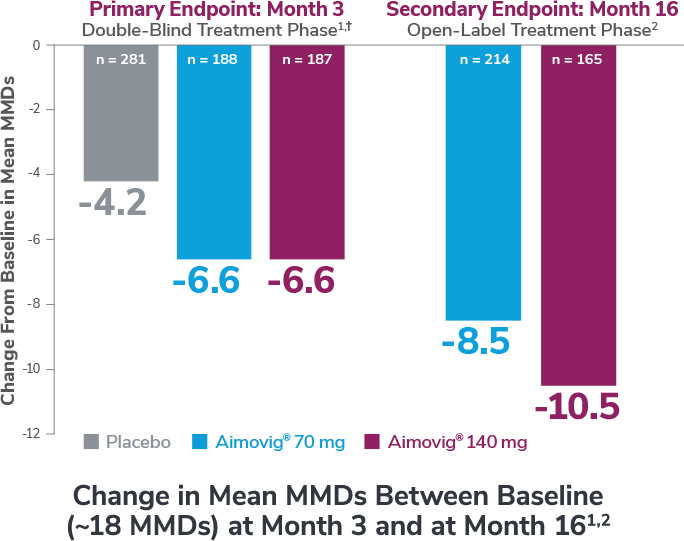Indication Aimovig® is indicated for the preventive treatment of migraine in adults.
Indication Aimovig® is indicated for the preventive treatment of migraine in adults.


Consider open-label treatment phase study limitations when interpreting results. The OLTP was not blinded, not controlled, and included inherent self-selection bias. Overall, 22.8% (n = 139) patients discontinued Aimovig® during the study, of which 2.6% (n = 16) patients discontinued due to AEs.2
Aimovig® was evaluated for prevention of chronic migraine in patients with ≥15 headache days per month, including ≥8 migraine days per month, in a phase 2, randomized, multicenter, 12-week, placebo-controlled, double-blind study.1
Patients who completed the 1-year OLTP had received the same OLTP dose (70 mg QM vs 140 mg QM) for at least 6 months at Week 52. Since subjects who switched from 70 mg QM to 140 mg QM should reach steady state ~3 months after the dose switch, week 52 should reflect the efficacy at 140 mg QM in patients who increased the Aimovig® dose and completed the OLTP. As a post hoc analysis, efficacy was evaluated in these subjects based on the last dose.2
*Versus placebo in the DBTP; vs baseline in OLTP.1,2
†Least-square means are presented. Statistically significant reductions in monthly migraine days at month 3 for Aimovig® 70 mg and 140 mg vs placebo (P<0.001). For both Aimovig® 70 mg and Aimovig® 140 mg, the difference from placebo was -2.5% (95% CI: -3.5, -1.4).1,3


Analysis is exploratory and has not been adjusted for multiple comparisons. No conclusions of statistical or clinical significance can be drawn.
*Preventive medications had failed due to lack of efficacy or intolerance by self-report.1
Aimovig® (erenumab-aooe) is indicated for the preventive treatment of migraine in adults.
Contraindication: Aimovig® is contraindicated in patients with serious hypersensitivity to erenumab-aooe or to any of the excipients. Reactions have included anaphylaxis and angioedema.
Hypersensitivity Reactions: Hypersensitivity reactions, including rash, angioedema, and anaphylaxis, have been reported with Aimovig® in post marketing experience. Most reactions were not serious and occurred within hours of administration, although some occurred more than one week after administration. If a serious or severe reaction occurs, discontinue Aimovig® and initiate appropriate therapy.
Constipation with Serious Complications: Constipation with serious complications has been reported following the use of Aimovig® in the postmarketing setting. There were cases that required hospitalization, including cases where surgery was necessary. The onset of constipation was reported after the first dose in a majority of these cases, but patients also reported later on in treatment. Aimovig® was discontinued in most reported cases. Constipation was one of the most common (up to 3%) adverse reactions reported in clinical studies.
Monitor patients treated with Aimovig® for severe constipation and manage as clinically appropriate. Concurrent use of medications associated with decreased gastrointestinal motility may increase the risk for more severe constipation and the potential for constipation-related complications.
Hypertension: Development of hypertension and worsening of pre-existing hypertension have been reported following the use of Aimovig® in the postmarketing setting. Many of the patients had pre-existing hypertension or risk factors for hypertension. There were cases requiring pharmacological treatment and, in some cases, hospitalization. Hypertension may occur at any time during treatment but was most frequently reported within seven days of dose administration. In the majority of the cases, the onset or worsening of hypertension was reported after the first dose. Aimovig® was discontinued in many of the reported cases.
Monitor patients treated with Aimovig® for new-onset hypertension, or worsening of pre-existing hypertension, and consider whether discontinuation of Aimovig® is warranted if evaluation fails to establish an alternative etiology.
Adverse Reactions: The most common adverse reactions in clinical studies (≥ 3% of Aimovig®-treated patients and more often than placebo) were injection site reactions and constipation.
Please see Aimovig® full Prescribing Information.
Contraindication: Aimovig® is contraindicated in patients with serious hypersensitivity to erenumab-aooe or to any of the excipients. Reactions have included anaphylaxis and angioedema.
Hypersensitivity reactions: Hypersensitivity reactions, including rash, angioedema, and anaphylaxis, have been reported with Aimovig® in post marketing experience. Most reactions were not serious and occurred within hours of administration, although some occurred more than one week after administration. If a serious or severe
References: 1. Aimovig® (erenumab-aooe) Prescribing Information. Thousand Oaks, CA: Amgen Inc; 2021. 2. Tepper SJ, Ashina M, Reuter U, et al. Long-term safety and efficacy of erenumab in patients with chronic migraine: Results from a 52-week, open-label extension study. Cephalalgia. 2020;40(6):543-553. 3. Tepper S, Ashina M, Reuter U, et al. Safety and efficacy of erenumab for preventive treatment of chronic migraine: a randomised, double-blind, placebo-controlled phase 2 trial. Lancet Neurol. 2017;16(6):425-434. 4. Data on file, Amgen; 2023.
References: 1. Ashina M, Tepper SJ, Brandes JL, et al. Efficacy and safety of erenumab (AMG 334) in chronic migraine patients with prior preventive treatment failure: a subgroup analysis of a randomized, double-blind, placebo-controlled study. Cephalalgia. 2018;38(10):1611-1621. 2. Data on file, Amgen; 2023.